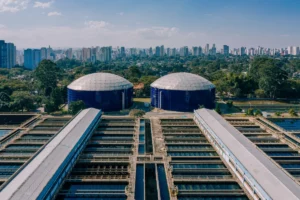The São Paulo government is setting the stage for Sabesp’s privatization, targeting post-Carnival to introduce a new sanitation contract.
This move will shift Sabesp to private hands and necessitate R$60 billion ($12 billion) in investments by 2060.
Natália Resende, infrastructure secretary, plans tailored contracts for 375 municipalities to meet individual needs and enhance infrastructure.
This step is critical for Sabesp’s future, aiming to secure essential investments under the Sanitation Framework.
The contract, ready soon, will undergo a 30-day public consultation in March, as planned by Sabesp’s CEO, André Salcedo.

Feedback will help refine the agreement, which must then gain approval from the Regional Units of Drinking Water and Sanitary Sewage Services (Uraes).
Natália aims for Uraes discussion by April, mindful of the upcoming municipal elections.
The goal is clear communication with municipalities to showcase the privatization benefits, reducing resistance.
The finalization will clarify the size of the follow-on offering, speculated to be between R$ 10 billion ($2 billion) and R$ 15 billion ($3 billion).
In addition, the government aims to attract global investors by listing on the B3 and New York Stock Exchange.
Sabesp’s overhaul is designed for long-term investor attraction, focusing on efficiency, governance improvement, and investment acceleration.
Plans include expanding Sabesp’s services beyond São Paulo, transforming it into a multinational sanitation entity.
Additionally, the São Paulo government plans to privatize the Metropolitan Company of Water and Energy (Emae), another significant move.
After revealing Sabesp’s contracts, São Paulo will sell its 97.6% stake in Emae via Genial Investimentos.
São Paulo aims for better infrastructure through privatization, boosting governance, efficiency, market appeal, and regional expansion.

